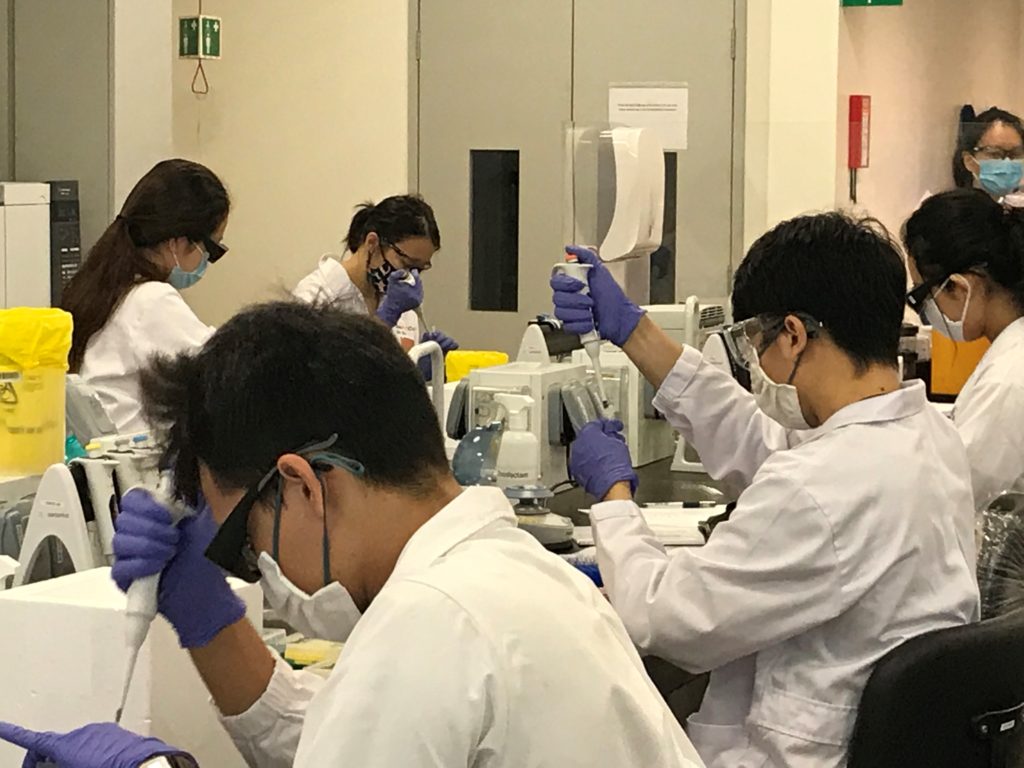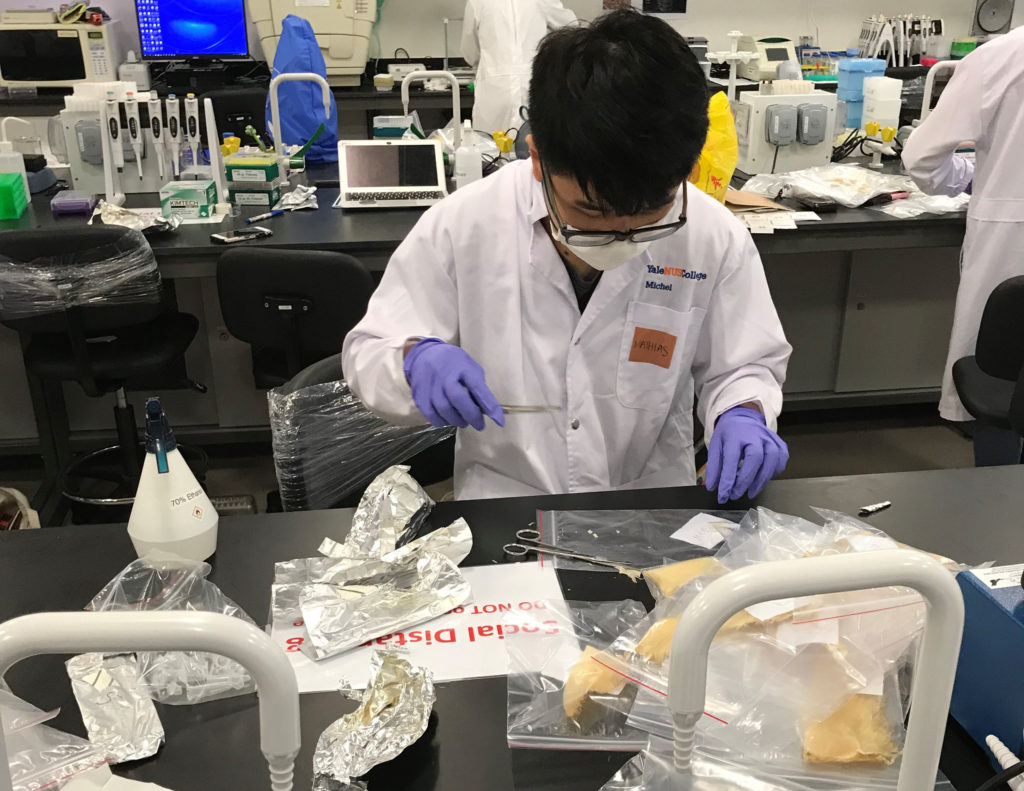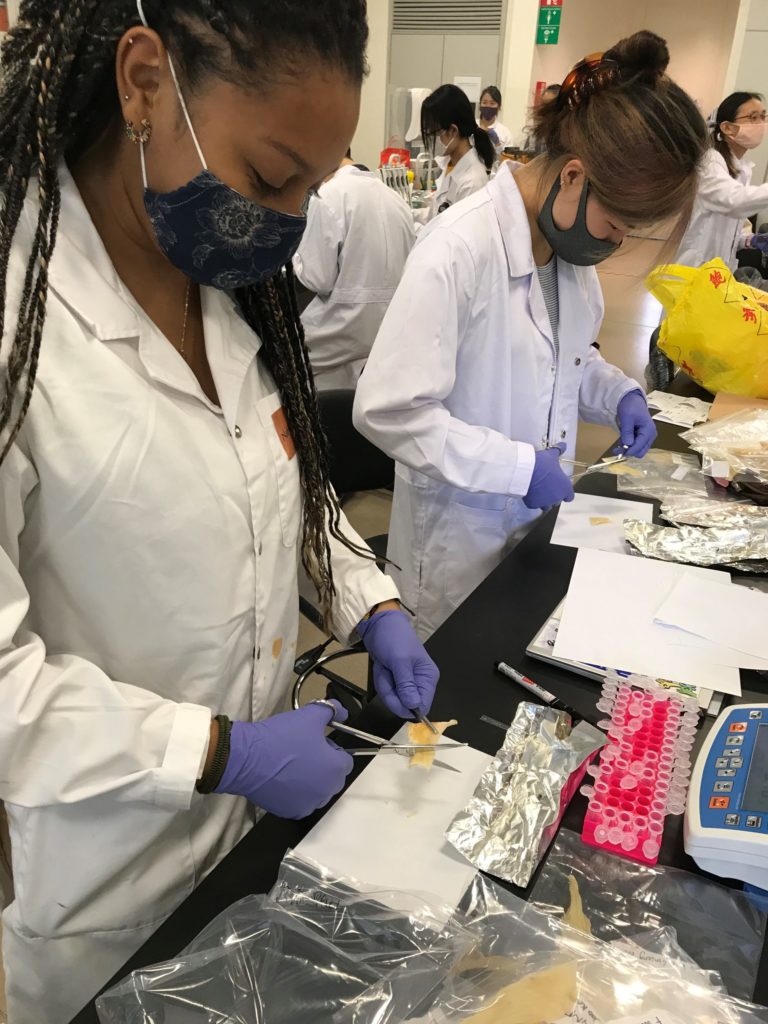Yale-NUS students learn DNA barcoding to identify illegally-traded shark species
 Students in the Wildlife Forensics and the Shark Fin Trade course learn how to use DNA barcoding techniques to identify shark species. Image provided by Asst Prof Benjamin Wainwright.
Students in the Wildlife Forensics and the Shark Fin Trade course learn how to use DNA barcoding techniques to identify shark species. Image provided by Asst Prof Benjamin Wainwright.
In the last few decades, the shark fin trade has threatened many shark species with extinction. This semester, in a new course at Yale-NUS College, Assistant Professor of Science (Environmental Studies) Benjamin Wainwright sought to help his students engage with this pressing environmental issue by equipping them with essential analytical, research and communications tools.
“Sharks sit at the top of many marine food chains where they play a role in regulating and balancing the population size of species they consume. The unsustainable shark fishing practices that support a billion-dollar global shark product trade are one of the main contributors that disrupt such delicate balances and degrade ecosystems,” explained Asst Prof Wainwright.
A major obstacle preventing successful regulation of the shark fin trade and shark conservation is the mislabelling and misidentification of dried products or carcasses that have had fins removed. In his course titled Wildlife Forensics and the Shark Fin Trade, Asst Prof Wainwright sought to shed light on this problem by teaching students to use DNA barcoding techniques to identify the sharks traded in Singapore and contribute to shark conservation.
As part of the course, students collected shark fin products from around Singapore, extracted DNA from the fin and compared it against the unique DNA barcodes of the different shark species that are accessible on a publicly available database. By engaging students in the scientific methodologies of DNA barcoding and identification, this contributes to existing resources that monitor the species of sharks being traded around the region. In fact, the collated results of students’ experiments have uncovered a number of trade regulated and endangered shark species freely available to consumers in Singapore.
Asst Prof Wainwright said that while “molecular techniques may appear quite intimidating to the uninitiated”, the skills needed to perform Polymerase Chain Reaction (PCR) tests and other techniques are not difficult to learn. One of the students, Mathias Ooi (Class of 2021), an Environmental Studies major, actually stepped out of his comfort zone of environmental humanities to learn the new techniques and equip himself with important scientific experimental skills.
“My biggest takeaway would definitely be something that Prof Wainwright said, ‘Don’t ever let anyone tell you that you can’t be a scientist.’ The last time I took biology was in secondary school, and I was naturally hesitant to enrol. Nonetheless, the whole process of running PCRs and identifying shark species has given me the confidence to do more environmental or life science research. I might even consider such a field for graduate school,” Mathias shared.
 Mathias extracting a sample from shark fin products for DNA testing. Image provided by Asst Prof Benjamin Wainwright.
Mathias extracting a sample from shark fin products for DNA testing. Image provided by Asst Prof Benjamin Wainwright.
In spite of pre-existing COVID-19 circumstances and the necessary safe distancing measures, the students continued to have a full experience doing laboratory research work. In fact, the laboratory work has trained students to be flexible and adaptable in their thinking as there are no fixed rules that would work in all situations and each sample differs from the last.
At the end of the semester, the students collated their findings and submitted a scientific paper that is now in review.
“The preparation and publishing of a peer reviewed manuscript is the primary way scientists communicate their findings. In the era of “fake news” and a growing mistrust in science (e.g., anti-vaxxers, climate change denial etc.) it is important people understand why scientists can be trusted. There is no better way to demonstrate this than going through the whole peer review process yourself, and this is what is happening right now as our paper makes its way through the review process”, said Asst Prof Wainwright.
 Nathalia (foreground) cutting up the shark fin product for DNA testing. Image provided by Asst Prof Benjamin Wainwright.
Nathalia (foreground) cutting up the shark fin product for DNA testing. Image provided by Asst Prof Benjamin Wainwright.
For Nathalia Murillo (Class of 2019), an Environmental Studies major who is interested in marine biology and conservation, the class proved to her that academic research might not be as daunting as she previously imagined it to be.
“From learning how to extract and analyse small amounts of DNA, to writing and submitting a research paper to a scientific journal, the class truly offered me hands-on opportunities to learn and explore a bit more of the area of study I want to continue pursuing”, she said.





